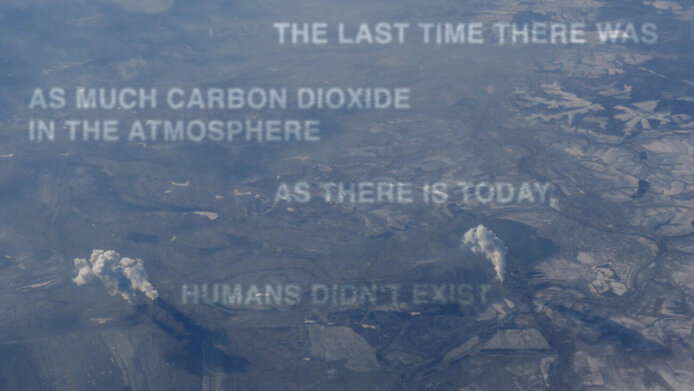Not sinking, swarming!

Oliver Ressler's climate story started in 1996, when the then 26-year-old had just graduated from the University of Applied Arts in Vienna and was organising his first major exhibition project “100 Jahre Treibhauseffekt” (100 years of greenhouse effect). The title makes reference to the Swedish scientist Svante Arrhenius, who had provided proof that humanity contributes to global warming through its CO2 emissions exactly 100 years earlier.
Since then, both the climate crisis and the artist's interest in the subject have grown. Starting in 2008, at the beginning of the climate justice movement, Ressler focused his attention on acts of civil disobedience by climate activists. In the United Kingdom, Ressler documented a successful protest against the construction of new coal-fired power plants by a German corporation.
Fluid boundaries between art and activism
“The movements have continuously grown in recent years, and I have focused on these major events, such as those on the occasion of the United Nations climate negotiations,” Oliver Ressler notes. He also explains that along with the subject, the role of artists has changed considerably over the past 25 years. In the beginning it was a matter of convincing the public that climate change was a real problem, but today an increasing number of artists are becoming actively involved in the movements against climate change. There are areas where “the lines between art and activism are becoming quite blurred, and I find that intriguing.“
Platform for exchange and dialogue
With the support of the Austrian Science Fund FWF, Oliver Ressler is currently working on the arts-based research project “Barricading the Ice Sheets”. He is cooperating with central protagonists of the climate movement who are working at the interface between art and activism. Ressler offers the participants a platform for exchange where they discuss methods, decision-making processes and plans for the future. These exchanges have resulted in the film “Barricade Cultures of the Future”, which will be screened at the opening exhibition for the project as of 4 September 2021 at Camera Austria in Graz, Ressler’s research institution. He plans further solo exhibitions in Zagreb, Berlin, Tallinn and London.
<figcaption>Trailer for “Not Sinking, Swarming”, 37 min., 4K, AT 2021</figcaption>
Insight into self-organisation of climate movements
The research project has led to another film entitled Not Sinking, Swarming which is based on a four-hour meeting in Madrid in October 2019, where delegates from different Spanish environmental groups came together to plan a civil disobedience action. “This film represents one of the few documents to provide direct insights into processes of self-organisation within the climate movement.” In order to protect those involved Ressler pixelated the footage. In the course of time, Ressler has developed different formats from documentaries to politico-poetic pieces. Ressler definitely sees himself as a mediator, and considers it important to pass on the know-how of different local movements both to the outside world and within the climate movement.
The pandemic as an obstacle
The pandemic has strongly affected the climate movement, because there is little they can do to change things without public visibility. It was only in the summer of 2021 that the first major actions, such as those organised by Ende Gelände in northern Germany could be held again. “It is important to come to grips with the pandemic soon, so that we can also protect the climate,” Ressler says with emphasis and notes that pressure from social networks alone is not sufficient to induce politicians to act. “We need civil disobedience in order to increase the pressure on governments.”
“Barricading the Ice Sheets” sharpens the focus on what could be done and takes a stance on the question of what the future of our planet should be. In his very own way, Oliver Ressler creates an alliance with the climate movement and demonstrates the contribution that art can make to sustainable change.
Personal details
Oliver Ressler is an artist and filmmaker who explores issues such as economics, democracy, migration, the climate crisis, and social movements. In addition to numerous exhibitions, Ressler has made 38 films that have been shown in thousands of social movement events, art institutions and film festivals. Since 2019, he has been working on the arts-based research project Barricading the Ice Sheets, which has received EUR 360,000 in funding by the Austrian Science Fund FWF. The research on which the project is based also gave rise to the exhibition Overground Resistance, curated by Ressler, which can currently be seen in Vienna.
Publication
Oliver Ressler (ed.): Barricading the Ice Sheets. Artists and Climate Action in the Age of Irreversible Decision, Graz: Edition Camera Austria, 2020
Solo exhibitions
Camera Austria, Graz (AT), 04 Sept. – 21 Nov. 2021
Museum of Contemporary Art Zagreb (HR), 30Nov. 2021 – 30 Jan. 2022
n.b.k. – Neuer Berliner Kunstverein, Berlin (DE), June – August 2022
Tallinn Art Hall, Tallinn (EE), 09 Sept. – 13 Nov. 2022
The Showroom, London (UK), October – December 2022





